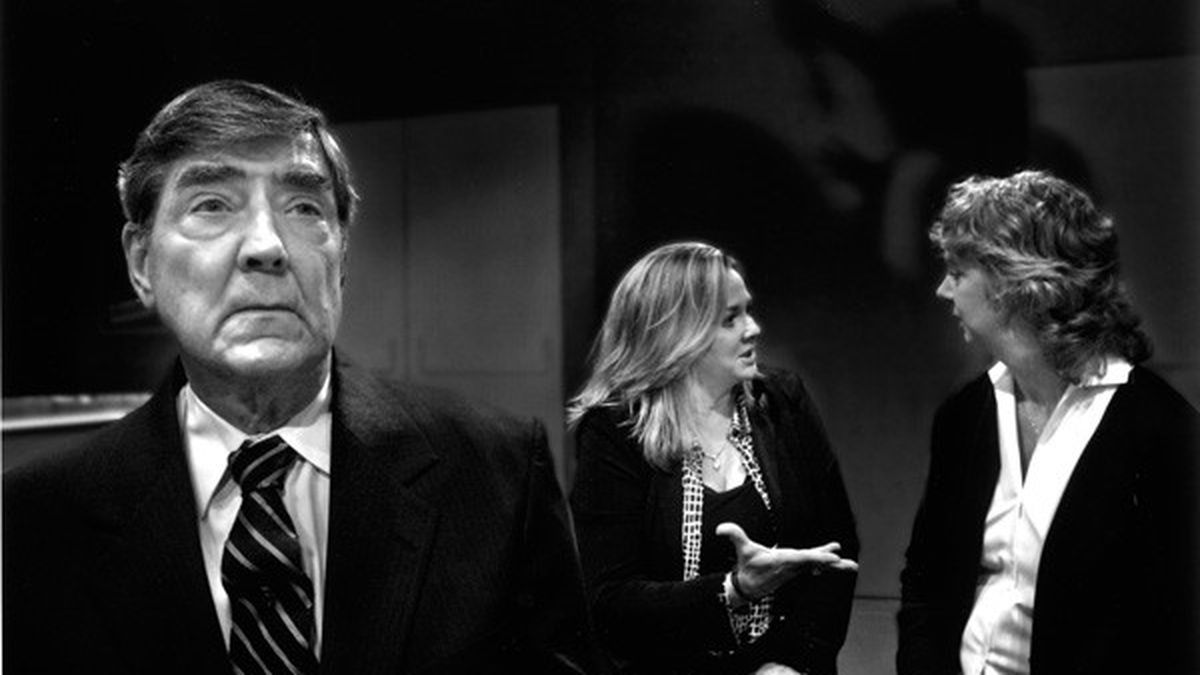John Hull, the alleged “Mister Mystery” of Masquers’ latest production, would normally be too stiff and soft-spoken to play the part of famed auteur Alfred Hitchock or television icon Rod Serling. But with the aid of a little conga-driven theme music and a gloomy opening monologue, he sets the tone for The Mystery Plays, an homage to Fifties-era radio dramas and sci-fi television series. Conceived as a pair of one-acts that loosely tie together, The Mystery Plays are purposefully, sometimes comically quaint. Yet they’re fattened with political themes, and the script is strong enough to pass muster.
“Strong” might even be an understatement. Playwright Roberto Aguirre-Sacasa, better known for his work on comic books like Nightcrawler, is a writer of robust, intensely detailed prose. Characters often recite large chunks of narration — including what appear to be stage directions. “A door blows open and snappy cold air blows in,” says the character Joe Manning (George Doerr), a horror filmmaker who encounters trouble after flirting with a nuerologist (Ken Sollazzo) on the train back to his hometown of Newport News. Throughout the play, Manning articulates his inner-monologue, to the point that it starts to seem like a reader’s theater.
Director Patricia Inabnet clearly had a skeletal template in mind when she conceived her version of Aguirre-Sacasa’s script. She uses subtle hints to signify big shifts in space and time.
And yet, the whole setup is chilling and visceral. Both plays, The Filmmaker’s Mystery and Ghost Children, take place in predictable places — either on a train, or in a town of southern Oregon where even the newer urban development seems two iterations behind. (One character marvels at the sudden encroachment of big-box retailers and chain video stores.) Both involve homicidal men who have a tricky way of rationalizing their actions. And both take place during Christmas, presumably the only time that professional adults leave the modern world and return to the creepy small towns of their upbringing.
In many ways, The Mystery Plays seem anachronistic. The male actors wear pancake face makeup. Certain roles, like Manning’s odd, emasculating mother or equally emasculating Hollywood agent (both played by Jeanette Sarmiento) rely on old, retrograde stereotypes. The set design and props (created by Rob Bradshaw and Lara Duchnick-Bradshaw, respectively), are primitive: a set of painted boxes represent a train; shadows slatted across the stage floor form the bars of a jail cell; stagehands wheel out a television when Joe Manning wants to watch CNN. In some ways, though, such unglamorous set pieces only underscore the power of Aguirre-Sacasa’s writing. The first play ultimately devolves into horror-film camp, but the second is a more well-rounded attempt to psychologize a killer, and explore his motivations. Marti Hoskins creates a memorable, if slightly understated, portrait of the killer’s sister, as she grapples with her own role in the catastrophe.
Themes of culpability and redemption also dominate Mike Daisey‘s new production, The Agony and the Ecstasy of Steve Jobs, which opened at Berkeley Repertory Theatre this week. In this case, though, Daisey quickly veers from the personal to the societal. It’s a strange time to excoriate the co-founder and former CEO of Apple, since Jobs just announced another medical leave of absence. To borrow a famous Daisey-ism, the timing is a bit awk-ward. Yet, he decided the show must go on.
Sitting in front of a lit grid that resembles a Tetris screen — but is later revealed to be a simple metal scaffold made of material that looks like industrial rebar — Daisey describes Jobs as a megalomaniac, a crazed genius, an imperialist of geeks, “not so much a micro-manager as a nano-manager,” a purveyor of “Steve Jobs lazer death vision,” and a Willy Wonka of gadgetry. Actually, he didn’t use the term “Willy Wonka” on opening night, but it’s appeared in his blog posts. He also catalogs the whole list of atrocities that Jobs has created for factory workers in southern China, who have been known to commit suicide on the job.
Certainly, it’s no panegyric. But Daisey manages to reveal how we’re all implicated in the Empire of Apple. Describing the industrial design of each Macintosh device with the same adjectives we’d apply to a sexual fetish, he shows how Jobs has turned technology into an obsession, and a catechism. Just as Last Cargo Cult recreated a Tannese ritual, this play turns the entire theater into the inside of a computer. In the end, Daisey urges us not just to game the system, but to jailbreak it.











